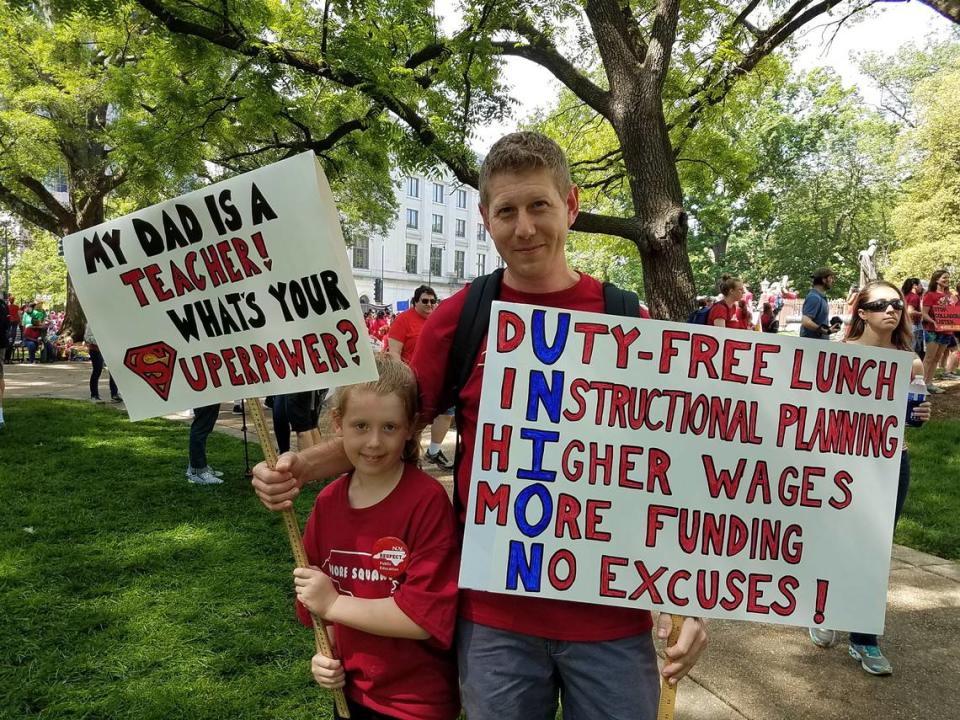How well is NC paying teachers? Lawmakers say state not keeping up with cost of living.
A bipartisan committee of state lawmakers is urging its colleagues to do more to boost teacher pay to help recruit and retain educators in North Carolina’s public schools.
The N.C. House Committee on Education Reform adopted a report on Monday that says teacher compensation isn’t keeping up with the cost of living and isn’t doing enough to ensure schools have enough highly qualified teachers.
The report asks lawmakers “to support North Carolina teachers and further assess compensation for teachers, as well as find ways to attract and retain teachers in hard-to-staff positions.”
“It is and always should be job No. 1 to try to get our compensation for teachers at a just, more professional level,” said Rep. John Torbett, a Gaston County Republican and committee co-chair.
The report comes ahead of the legislative session that will begin in April. The report has other recommendations, including changing how the state grades schools and providing more money to change how math is taught.
NC near bottom at beginning teacher pay
Last year, the National Education Association ranked North Carolina 46th in the nation in beginning teacher pay and 34th in average teacher pay. In addition, schools started the school year with more than 3,500 teaching vacancies.
In response, last year’s state budget raised the base salary for beginning teachers by $2,000 to $39,000 this school year. It’s set to rise to $41,000 next school year.
The state budget provided an average teacher raise of 7% over two years, with newer educators getting raises of more than 10%. The state’s most experienced teachers are only slated to get 3.6% raises over the two years of the budget.
Senate Republicans said the state budget will increase the average pay for teachers to $60,671 by the 2024-25 school year. That figure includes the money that counties provide to supplement the state base pay.
Pay is not keeping up with inflation
The Education Reform Committee has a GOP majority, so its report praises the General Assembly for raising pay for beginning teachers and creating a state-funded salary supplement for teachers in smaller or lower wealth counties.
“However, the Committee finds that even with these significant investments, teacher compensation has still not kept up with the rising cost of living, the increasing employment opportunities for female, college-educated professionals, or the pay for other public sector employees,” according to the committee report.
“The Committee recognizes that North Carolina’s teacher compensation structure is not ensuring that hard-to-staff subject area positions and schools are sufficiently filled with highly qualified teachers.”

In a related recommendation, the committee recommends considering how best to further implement the Advanced Teaching Roles program. The program pays effective teachers more money if they take on additional duties such as working with beginning teachers.
“We’re all in agreement that we want to see teacher compensation be very much clarified, because we’re losing workforce so significantly,” said Rep. Maria Cervania, a Wake County Democrat.
Change school performance grades
The report also recommends revising how every public school gets a single A through F performance grade. The grade is 80% based on passing rates on state exams and 20% on growth on the tests.
“The Committee finds that the State’s current A-F school performance grades do not provide a balanced assessment of a school and do not effectively communicate school quality,” according to the report.
The committee recommends modifying the formula to create a system where schools would get a single grade based on an average of four factors: proficiency on exams, growth on exams, school readiness and school climate/opportunity.
Readiness would look at how well schools are preparing students for post-secondary opportunities such as going to college, the military or the workforce.
Opportunity would include how many students are taking part in intra-curricular and extracurricular activities, school safety ratings from the N.C. Teacher Working Conditions Survey and the level of student chronic absenteeism.
State Superintendent Catherine Truitt had recommended the new system to lawmakers in February. But Truitt had proposed giving a separate letter grade for each of the four measures instead of averaging them into one grade.
Michele Morrow defeated Truitt this month in the Republican primary. Morrow will run in November against Democrat Mo Green.
Change how math is taught
Other report recommendations include:
▪ Develop a plan to identify funding sources to help schools replace aging computers. Schools used one-time federal COVID aid to purchase computers for students to use when they were learning online.
▪ Study the impact that funding at the recommended student-to-school counselor ratios may have on student outcomes. There’s one counselor statewide for every 361 students instead of the nationally recommended ratio of one for every 250 students.
▪ Study the impact that a new salary schedule may have on principal recruitment and retention. The report doesn’t go as far as the recommendations from the N.C. Association of School Administrators to pay principals more if they have many low-income students or have been a principal for at least five years.
▪ Support the state Department of Public Instruction’s comprehensive math reform proposal designed to get students ready to take the Math 1 course. It’s meant to build on how the state revamped its teaching of reading to improve literacy skills among students.
DPI wants to develop a system for math, similar to what’s used for the Read To Achieve program, where teachers regularly test the skills of their youngest students.
Torbett said he was excited by the math proposal. He said improving the state’s reading, math and science instruction will provide students “the best access to earning an income to support both them and potentially a family.”

